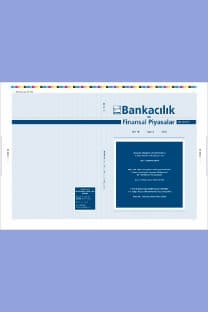Ekonomik Büyüme ve Kurumsal Kalite İlişkisi: Bir Panel Veri Analizi
Bu çalışmanın amacı kurumsal kalite faktörlerinin ülkelerin ekonomik büyümeleri üzerinde etkili olup olmadığını incelemektir. Bu amaçla, Almanya, Belçika, Fransa, İngiltere, İspanya, İrlanda, İtalya, Yunanistan, Hollanda, Portekiz ve Türkiye olmak üzere toplam 11 ülkede 1990-2015 dönemini kapsayan sürede ekonomik büyüme ile kurumsal kalite arasında bir ilişki olup olmadığı Mankiw-Romer-Weil (MRW) büyüme modeli kullanılarak panel veri analiziyle ekonometrik açıdan araştırılmıştır. Bu çalışmada, kurumsal kalite faktörlerinden mülkiyet haklarının korunması, hukukun üstünlüğü ve yolsuzluğun kontrolü değişkenleri ile ekonomik büyüme arasında pozitif yönde bir ilişki olduğu, yargı bağımsızlığı ve düzenlemelerin kalitesi ile ekonomik büyüme arasında negatif yönde bir ilişki olduğu ekonometrik olarak tespit edilmiştir.
The Intermingling Relationship of Economic Growth and Institutional Quality: A Panel Data Analysis
The purpose of this study is to investigate the relationship between economic growth and institutional quality. In this study, the relationship between economic growth and institutional quality is analyzed econometrically by using Mankiw-Romer-Weil (MRW) growth model and employing panel data regression analysis in the sample of 11 countries including Germany, Belgium, France, England, Spain, Ireland, Italy, Greece, Netherlands, Portugal and Turkey for the period between the years 1990 and 2015. Analysis results imply that protection of property rights, rule of law and control of corruption have a positive effect on economic growth, but judicial independence and regulatory quality have a negative effect.
___
- 1. Abeyasinghe, R. (2004). “Democracy, Political Stability, and Developing Country Growth: Theory and Evidence” IWU Honors Projects. Paper 17.
- 2. Acemoğlu, D., Johnson, S., Robinson, J. ve Thaicharoen, Y. (2003). Institutional Causes, Macroeconomic Symptoms: Volatility, Crises and Growth. National Bureau of Economic Research. Working Paper 9124.
- 3. Acemoğlu, D. ve Robinson, J. (2008). The Role of Institutions in Growth and Development. World Bank Working Paper No.10.
- 4. Aghion, P., Alesina, A., ve Trebbi, F. (2007). Democracy, Technology and Growth. NBER Working Paper, no:13180 (2007), s.1-20.
- 5. Alesina, A. ve Wagner, A. (2003). Choosing and Reneging on Exchange Rate Regimes. NBER Working Paper. No. 9809, June 2003.
- 6. Barro, R. ve Lee, J.W. (2000). A New data Set of Educational Attainment in the World. http://www.barrolee.com/papers/Barro_Lee_Human_Capital_Update_2011Nov.pdf
- 7. Bayar, G., Güloğlu, B. ve Tokpunar, S. (2011). Ekonomik Yaklaşım Kongresi: “Türkiye Ekonomisinin Dinamikleri: Politika Arayışları”, 22-23 Aralık.
- 8. Breusch, T. ve Pagan, A. R., (1980). “The Lagrange Multiplier Test and Its Applications to Modelspecification Tests in Econometrics”, Review of Economic Studies, 47: 239-53.
- 9. Brooks, C. (2008). Introductory Econometrics for Finance (2th Ed.). UK, Cambridge University Press.
- 10. Bussiere, M. ve Mulder, C. (1999). Political Instability and Economic Vulnerability. IMF Working Paper. No. WP/99/46.
- 11. Calvo, G. ve Mishkin, F. (2003). The Mirage of Exchange Rate Regimes for Emerging Market Countries. Journal of Economic Perspectives. 2003, v17 (4,Fall), 99-118.
- 12. Chong, A. ve Calderon, C. (2000). Institutional Quality and Income Distribution. Economic Development and Cultural Change. Vol. 48, No.4, 761-786.
- 13. Dawson, J., (2013). Causality in the Freedom-Growth Relationship. European Journal of Political Economy, Cilt 19, Sayı 3, s. 479-495.
- 14. Du, J. (2010). Institutional Quality and Economic Crises, The Review of Economics and Statistics, Cilt 92, Sayı 1, s. 173–179.
- 15. Dünya Bankası, (2018), Dünya Gelişmişlik Göstergeleri. https://datacatalog. worldbank.org/dataset/world-development-indicators.
- 16. Fraser Enstitüsü, (2018), Dünya Ekonomik Özgürlükler Endeksi. https:// www.fraserinstitute.org/economic-freedom/map?geozone=world&page=m ap&year=2016
- 17. Greene, W.H. (2003), Econometric Analysis, New Jersey: Prentice Hall Press.
- 18. Hall, R. ve Jones, C. (1998). Why Do Some Countries Produce So Much More Output Per Worker Than Others? The Quarterly Journal of Economics. Vol. 114, No. 1 (Feb., 1999), pp. 83-116.
- 19. Knack, S. ve Keefer, P. (1995). Institutions and Economic Performance: CrossCountry Tests Using Alternative Institutional Indicators. World Bank Working Paper. November 1995.
- 20. Knack, S. ve Keefer, P. (1998). Why Don’t Poor Countries Catch Up? A CrossNational Test of An Institutional Explanation. Center For Institutional Reform and The Informal Sector. 590-602.
- 21. Law, S. H. ve Bany-Ariffin, A. N. (2008). Institutional Infrastructure and Economic Performance: Dynamic Panel Data Evidence. Structural Reforms and Public Choices. 542-557.
- 22. Mankiw, G., Romer, D. ve Weil, N. (1992). A Contribution to the Empirics of Economic Growth. The Quarterly Journal of Economics. May 1992, pp. 407-437.
- 23. OECD (2019) https://stats.oecd.org En Son Erişim Tarihi: 10.09.2018
- 24. Pesaran, M. H., (2004) “General Diagnostic Tests for Cross Section Dependence in Panels”, Cambridge Working Papers in Economics, 435.
- 25. Pesaran, M. H., (2008) “A Simple Panel Unit Root Test in the Presence of Cross Section Dependecy”, Cambridge Working Papers in Economics, 0346.
- 26. Rodrik, D., Subramanian, A. ve Trebbi, F. (2004). Institutions Rule: The Pri-macy of Institutions Over Geography and Integration In Economic Development. Journal of Economic Growth. June 2004, Volume 9, Issue 2, pp 131– 165.
- 27. Shimpalee, P. ve Breuer, J. (2006). Currency Crises and Institutions. Journal of International Money and Finance. 2006, vol. 25, issue 1, 125-145.
- 28. Shimpalee, P. ve Breuer, J. (2007). An Event Study of Institutions and Currency Crises. Review of Financial Economics. 2007, vol. 16, issue 3, 274-290.
- 29. Turhan M. ve Taşseven .Ö. (2010). Yönetim Fonksiyonlarının Uygulandığı Alanlarda Ortaya Çıkan Hata Değerlerinin Oluşturduğu Yeni İlişkilerin Panel Veri Modelleri ile İrdelenmesi, İ.Ü. İktisat Fakültesi, Ekonometri ve İstatistik Dergisi, Sayı:11, 128–153.
- ISSN: 1307-5705
- Yayın Aralığı: Yıllık
- Başlangıç: 2007
- Yayıncı: Bankacılık Düzenleme ve Denetleme Kurumu
